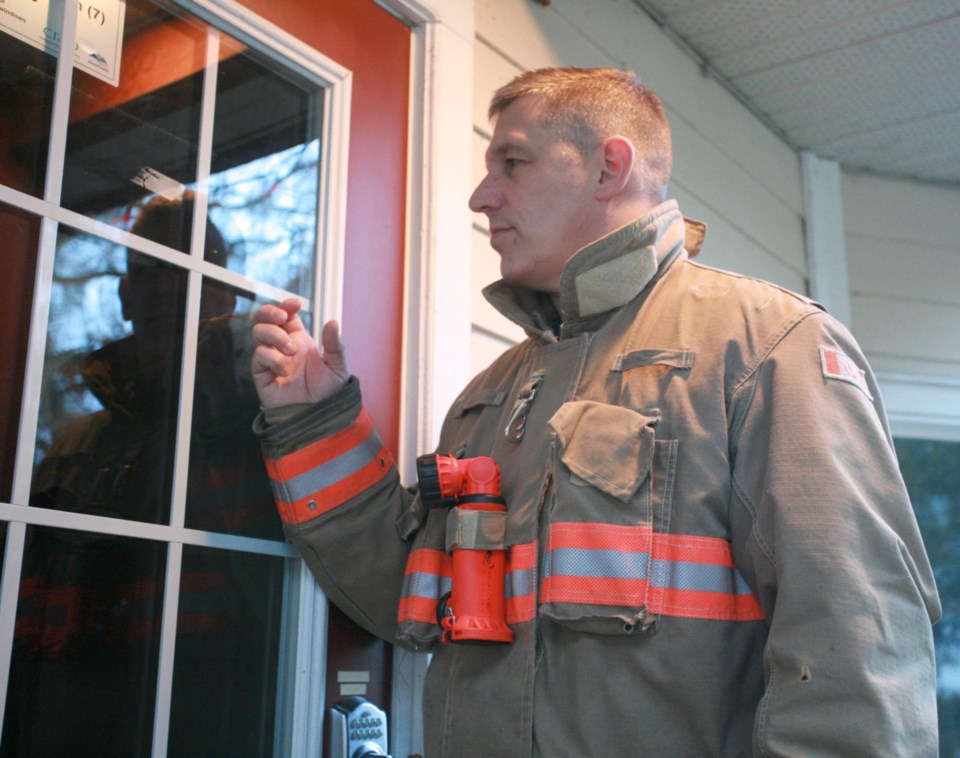My phone rang early Tuesday morning, just a few hours after I went to bed. I was told there was a tsunami warning, and the Metchosin Emergency Operations Centre had been activated.
I’ve volunteered with the Metchosin Emergency Program for about a year and half, and this was my first emergency call.
Being a single parent, I had to wake up my eight-year-old daughter, who grabbed her iPad, and we headed to the fire hall.
I knew we had a potential for an emergency situation, but I was surprised to see Metchosin Road filled with cars driving away from the water. I drove past St. Mary’s Church, the district’s designated reception centre, to see a full parking lot of cars and the church lit up.
“This is the real thing,” I thought to myself as I drove.
The fire-hall and operations-centre parking lots were also full, with cars parked along Happy Valley Road. These were the cars of volunteers, who were up in the wee hours serving their community.
Firefighters had been travelling through the district, knocking on doors of the homes in low-lying areas, telling residents to get to high ground.
I watched as Stephanie Dunlop, Metchosin fire chief and emergency-program co-ordinator, gave directions, spoke to the media and fielded questions from the public. Watching her work gave me great admiration for her and the responsibility she holds.
Communities across Greater Victoria and the coast were all working through the night, too.
I know a lot of people in Greater Victoria slept through this warning. People have to remember that if they slept through it, it doesn’t mean it didn’t happen. With the amount of work and dedication I saw in the middle of the night, it made me proud of my community and the people working to serve others.
About 4:15 a.m., we heard the water was receding in the harbours in Alaska, and waves were being reported at 12 metres out in the ocean. I knew my daughter and I were safe where we were, but at that moment it was hitting me that this was real.
It was only a few minutes later we heard the tsunami warning was called off. I posted the announcement on Metchosin Emergency Program’s social-media networks and headed off to start my day.
While drinking a coffee, I continued to read various posts about the warning on social media. There was a lot of criticism from people who slept through the warning and weren’t notified.
I read comments like this from people all over Greater Victoria and up the B.C. coast.
Obviously, not everyone will receive a knock on the door in the case of a tsunami warning. People receiving knocks are the ones most likely to be affected and most likely to be in danger.
Some people posted that they turn their cellphones off at night and want a different way to get a notification. I even saw someone write that it’s better if these warnings happen during the day. If you sign up for alerts and you turn your cellphone off at night, that’s really your own issue.
Each municipality is responsible for its own emergency preparedness. If you want receive alerts, contact your municipality and find out how to sign up. If you want to know right away, join your community’s emergency program, and you can be trained to help.
We each need to do our own part in emergency preparedness and ensure we have plans in place for our families and ourselves. Each person should know if they live in a tsunami zone, where your community’s reception centre is, and have an emergency bag packed and ready to go.
I am glad I woke my daughter up at 3 a.m. and we went to volunteer. I explained why we were up early, that we were helping our community and needed to ensure we were safe. I consider this a valuable experience and drill for us both.
Since the warning was issued and then called off, people across Greater Victoria have been signing up for emergency alerts and following emergency-programs social media in their areas. If anything, this tsunami scare might have sparked an urgency for some people to rethink their knowledge of emergency preparedness, and I think that’s a good outcome.
Charla Huber works in communications and Indigenous relations for M’akola Group of Societies.



